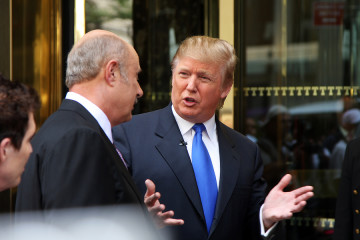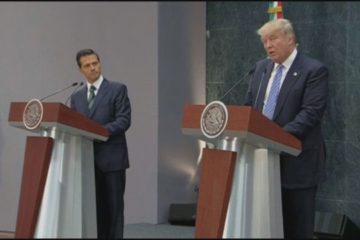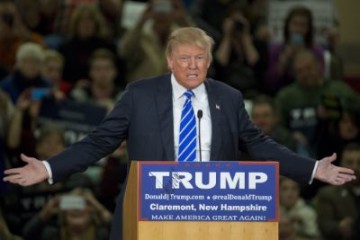Trump Phenomenon Is Nothing New in U.S. Politics: Stephen Mihm

©2015 Bloomberg View
NUBIE36S972G
(Bloomberg View) — Donald Trump’s eruption into the Republican presidential race has been held up as evidence of a new phenomenon in American politics.
But it’s not. The real estate mogul has precedents, and there’s one historical doppelganger in particular whose bid for the presidency followed much the same trajectory. Like Trump, he was a New York City magnate who built a business empire on construction and real estate. He rode to prominence by baiting foreigners and immigrants, divided one of the major political parties, and briefly captivated the political establishment.
His name was George Law. A fawning article in the United States Magazine in the election year of 1856 described him as a humble farmer’s son, born in upstate New York, who by dint of industry, hard work, and unrelenting ambition rose to fame and fortune as the deep-pocketed contractor “of some of the most important of our public works.”
Law’s empire built dams, aqueducts, bridges, railroads, canals and other large-scale projects. He eventually snapped up land in Columbia, Mexico, and elsewhere while simultaneously acquiring stakes in major railroads and canals. For a time, he was the only magnate who could go toe-to-toe with Cornelius Vanderbilt.
Law always operated on a grand scale. After the discovery of gold in California, he made millions by building or buying over a dozen ocean-going steamships to connect the east and west coasts. He modestly christened one of largest ships the George Law.
He also acquired a reputation for being a hothead. In 1852, one of the officers abroad his steamer, the Crescent City, attacked the government of Cuba in the press. In response, the Spanish Captain General of Cuba threatened armed retaliation if the Crescent City returned to the island with the officer aboard.
Law simply could have transferred the officer to another line, but instead he decided to send the ship to Cuba in defiance of the threat. The incident sparked a diplomatic imbroglio, and President Millard Fillmore accused Law of trying to “threaten war on his own account for the purpose of seeking redress for real or imagined injuries.”
Law shot back by suggesting Fillmore was a coward; Law’s biographer would later applaud his “manly and independent conduct when the minions of the Spanish Crown attempted to outrage the rights of an American citizen, and to dishonor his country’s flag.”
This stand earned him the nickname “Live Oak George,” a reference to his firmness of purpose and the quality materials used to build his steamships. As his fame grew, he began angling for the presidency in anticipation of the 1856 election.
It was a tumultuous time in U.S. politics, as the slavery question began splintering the two-party system of Democrats and Whigs. Powerful third parties had already made inroads on the federal and state level. The most powerful of these was an anti- immigrant, anti-Catholic movement dubbed the “Know-Nothing Party,” though its promoters preferred to call it the “American Party.”
The Know-Nothings offered plenty of opportunities for the aspiring demagogue. They tapped the wellspring of resentment caused by the huge influx of Irish immigrants, many penniless and poorly educated, who had fled a famine ravaging their native country between 1845 and 1852.
Law tried to capture the Know-Nothing nomination by selling his bona fides as a stalwart defender of the American Way. In an open letter published in 1855, he decried the failure of these immigrants to assimilate as earlier generations of immigrants had done — for not “mixing with American citizens, and blending themselves with the manners and customs of the new dispensation.”
Whether Law actually believed any of this remains an open question. Indeed, his opponents began publicizing an inconvenient fact: Law was of Irish descent and, according to multiple sources, may have been born in Ireland.
The only man who could stand in his way was his old nemesis, Fillmore, who had left the Democratic Party for the Know-Nothings. Alarmed by Law’s insurgent campaign, Fillmore’s men lambasted Law in their papers, declaring that although it might be for Law “a profitable speculation to be President, to the people it would be ruinous.”
The two men’s allies clashed at the nomination convention in Philadelphia. Fillmore won the day.
But Law wasn’t finished. Thirsting for revenge against Fillmore, Law managed to lead a breakaway, anti-slavery faction of the Know-Nothing Party to a separate convention that assembled as the “The North American Party.” He and others ultimately steered these defectors into the newly created Republican Party.
The end result was the election of the Democrat James Buchanan, who is regularly rated as one of the worst three presidents, if not the worst.
This column does not necessarily reflect the opinion of the editorial board or Bloomberg LP and its owners.
To contact the author of this story: Stephen Mihm at smihm1@bloomberg.net To contact the editor responsible for this story: Max Berley at mberley@bloomberg.net
For more columns from Bloomberg View, visit http://www.bloomberg.com/view







No Comment